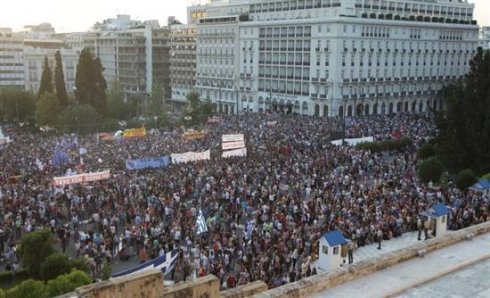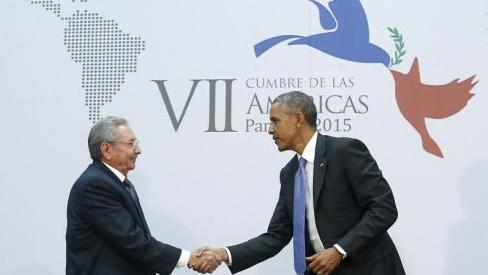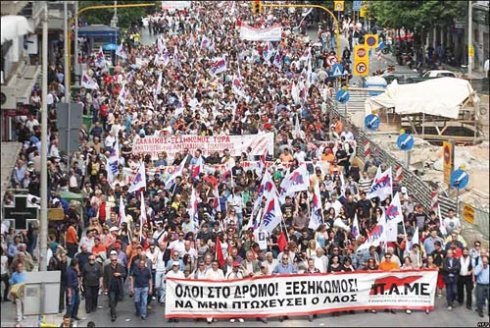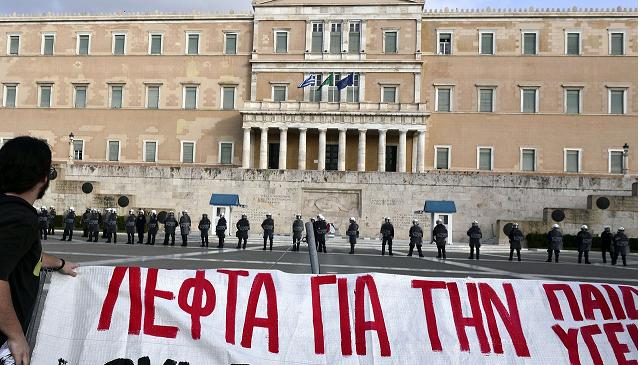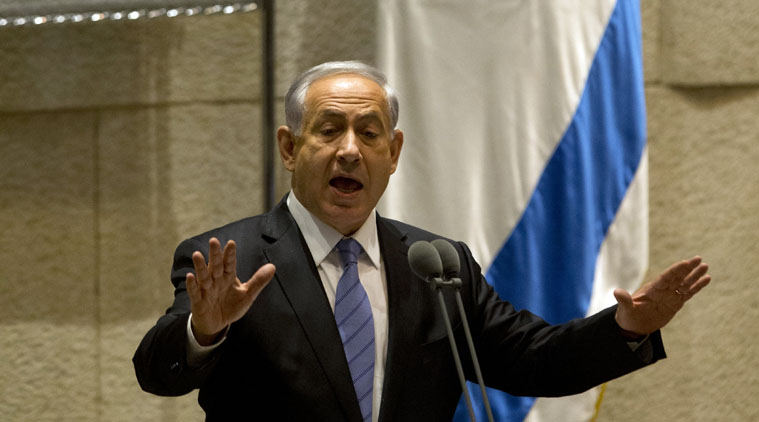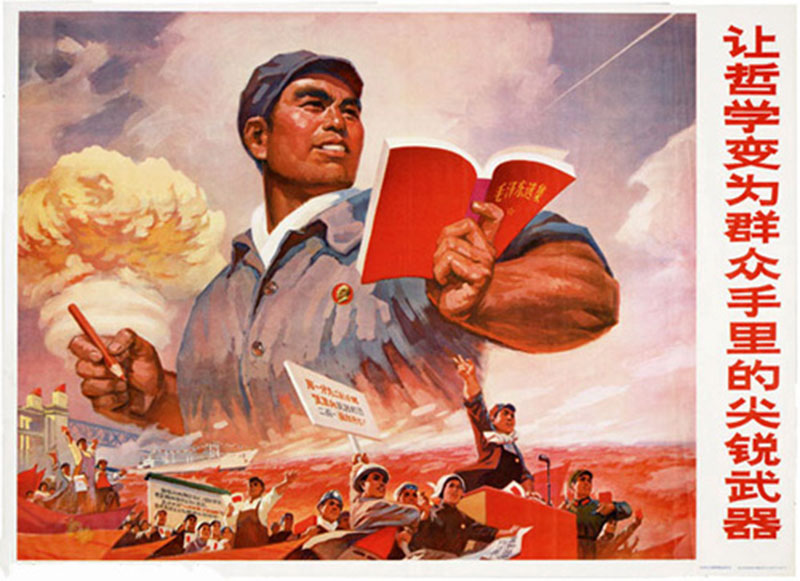France
Paralysis and strategic crisis
17/02/2011
The first congress of the New Anticapitalist Party of France (NPA), held last weekend in Montreuil just outside Paris, ended in a dismal failure. None of the platforms presented was able to win a majority. The outgoing leadership – including the spokesman Olivier Besancenot and historical leaders such as Alain Krivine – barely got 41.8% of the votes for their orientation document. It was not even possible to produce a joint declaration by the congress due to strong disagreements between the main platforms: Platform 3 (PF3) or the ‘unitary platform’, which is in favour of an agreement with the reformists at any cost, that is with the Parti de Gauche (Left Party) of Jean-Luc Mélenchon, former minister in Lionel Jospin’s social democratic government, and the French Communist Party (PCF); Platform 2 (PF2), called the ‘identity platform’ by the bourgeois press, which wants a candidacy of Olivier Besancenot for the 2012 presidential elections and proposes to return to ‘the NPA of its origins’ and to orient towards the workplaces; Platform 1 (PF1), which vacillates between PF3 and PF2 on the electoral issue and defines itself as ‘anticapitalist’ and ‘unitary’. As a result of this lack of definition, seven members of the outgoing leadership decided to join the Parti de Gauche. This occurs in the context of a loss of adherents, who went from about 9,000 at the founding congress two years ago to about 3,550 who voted in the electoral assemblies prior to this congress [1]
A strategic crisis
The crisis of the NPA is not conjunctural but rather of a strategic character. Its roots are in the basis on which the NPA was founded, as a broad anti-capitalist party without a clear strategic and programmatic view that sought to unite revolutionaries with militants of radical reformist origin, that is to say anti-neoliberals who were disenchanted by the social liberal turn of the Socialist Party and its old ally in the government of the ‘plural left’, the French Communist Party (PCF) – a disenchantment that had been expressed in the formation of alternative, feminist and ecologist movements and the rejection of the referendum on the European Constitution in 2005.
This deliberately centrist orientation, devised by the leadership of the former Revolutionary Communist League (LCR), sought to rid itself not only of a clear conception of the revolutionary transformation of society (as exemplified by the LCR’s abandonment of the struggle for dictatorship of the proletariat, even before the formation of the NPA), but of any reference to revolutionary communism, even by name. This was a product of the vision that a ‘new phase’ had opened after the fall of the Berlin Wall in which the old lessons and revolutionary reference points of the imperialist epoch of crises, wars and revolutions had became obsolete and should be replaced by the famously vague definition of ‘Socialism in the 21st Century’ – taken from the Chavez movement in Venezuela. On the positive side, the NPA differentiates itself from reformism, unlike the scandalous capitulation of the former LCR’s sister section in Brazil, which had a minister in the capitalist government of Lula, and the support given by Sinistra Critica in Italy to the imperialist government of Prodi with the participation of their senator, Turigliatto, in the parliamentary bloc of Rifondazione Comunista (giving a vote of confidence for Prodi, for the war credits for Afghanistan, Lebanon, etc.). However, the explicit abandonment of a revolutionary strategy and programme leaves a door open permanently to reformism.
Initially encouraged by the results of the presidential elections of 2007, when Besancenot came out ahead not only of Lutte Ouvrière (an organisation of Trotskyist origin, the historical competitor of the LCR whose principal figure was their presidential candidate until that time, Arlette Laguiller) but also of the Greens and the PCF, the ‘magic’ and the high expectations could be maintained during the early years of Sarkozyism, when due to the crisis of the Socialist Party (PS), the ‘young postman’ – as the bourgeois press refers to Besancenot – appeared to be the best opposition to Sarkozy. These were exceptional conditions in which the NPA occupied the space vacated by the old reformism – which was in crisis following the bourgeois restoration and the capitalist offensive over two decades. This had led to the transformation of the PS into an openly bourgeois party after two neoliberal governments led by François Mitterrand that cost it its working class rank and file. But now these conditions have been eroded. Today, the historical crisis of capitalism that we are living through has made the space between anti-capitalism and social-liberalism one of the most populated on the political spectrum, with a proliferation of organisations and political positions: for example, the above-mentioned Parti de Gauche (created in the same image as Die Linke in Germany), the relative rehabilitation of the PCF (given its historical decline), the Fédération pour une Alternative Sociale et Ecologique (FASE), the left wing of the green movement, and the left wing of the PS led by Benoît Hamon, who has been obliged to move to the left.
Even though the NPA participated in the powerful movement of the working class and the youth in France in the autumn of 2010 and in the wave of strikes using radical tactics in 2009, it suffered from a lack of real implantation in the workplaces and had no programme or strategy independent of the trade union leaderships. In this context, it was unable to offer the most minimal alternative and could not even strengthen itself by recruiting a new layer of workers out of the struggle. Even though this generation is not politically organised behind a radical alternative, the NPA was unable to attract the best elements.
Two years after its creation, the hypothesis that underpinned the founding of the NPA has been proved totally wrong both at the level of the political-electoral arena, where its plans were increasingly thwarted as a result of the discrediting of neoliberalism after the outbreak of the crisis, and at the structural level, in the context of the bourgeois offensive against the masses and the response to this, where the NPA showed its impotence in the class struggle.
Internal paralysis
In the face of this strategic crisis, PF3 sought to resolve the ambiguities of the original project in a rightwards direction, while PF2 stated that the majority of the outgoing leadership had made an opportunist turn, undermining the foundations on which the NPA was created. PF2 was focussed on 2012, in rejecting any agreement with the reformists and maintaining Besancenot’s candidacy at all costs, without the slightest unitary gesture. In this context, PF1 tried to maintain an increasingly difficult balancing act which led to the failure of this congress, where the leadership preferred a disastrous congress to aligning with one or other of the two opposing poles, which could put the unity of the NPA at risk. It was an attempt to strike a compromise without breaking unity. However, the NPA is increasingly battered, in crisis and totally paralysed politically – a situation which the congress itself has worsened.
The role of the left of the NPA and the emergence of Platform 4, the revolutionary tendency
There is no doubt about the overtly liquidationist character of PF3, whose policies imply nothing less than the creation of a ‘social and political front’ with the reformists – in other words, a strategic alliance with them. In the face of this policy, PF2 appears as a force resisting the rightward shift, given the ambiguities of PF1 even in the electoral arena. However, the strategic orientation – that of going back to the origins of the NPA – is completely impotent and unable to overcome the incorrect programmatic bases that are responsible for the strategic crisis affecting the NPA – a crisis which, sooner or later, unless there is a 180-degree reorientation, will condemn it to splits and failure. These programmatic and strategic limitations of PF2 – a platform which includes parts of the left wing of the former LCR [2], the majority of the former JCR youth organisation and some groups which joined the NPA like L’Étincelle (the former LO faction), Gauche Révolutionnaire (linked to the CWI), La Commune, etc – explain the emergence of PF4, which includes militants of the FT-CI together with important workers’ leaders (some of the few that exist in the NPA), militants of CLAIRE and other militants from various backgrounds. Without a programmatic and strategic reorientation diametrically opposite to that proposed by PF3, it will be impossible to build a revolutionary instrument of the necessary calibre to intervene in the struggles that the French working class has been developing since 1995 and that experienced a qualitative leap in the autumn of 2010 – a kind of a ‘defeated’ dress rehearsal of the struggles to come.
To succeed we need an openly revolutionary party. The crisis is generating radicalism and discontent, but this will not mechanically translate into Marxism and class consciousness. For this reason the NPA has to respond to this anger with the same radicalism, but from an internationalist and class-based perspective – in stark contrast to the extreme right-wing National Front of Le Pen that presents a populist, xenophobic and racist alternative to the oppressed classes.
To postpone to the indefinite future decisions on programmatic and strategic issues and on the nature of party – anticapitalist or openly proletarian and revolutionary – as the main platforms (including PF2) propose, can only lead to the demoralisation of the best elements on the left of the NPA and facilitate the offensive that the reformist currents are carrying out from the outside, pressuring the NPA to break out of its ‘isolation’, joining them as a way to reach the masses. But numbers are not always the critical factor. The only way to reach the masses is through a revolutionary reorientation of the NPA, which will enable it to play a role in coming struggles and win a new generation of workers to the ideas of communism and proletarian revolution. Any attempt to find a shortcut will surely lead to defeat.
Translation: Wladek Flakin, Revolutionary Internationalist Organization (RIO), www.onesolutionrevolution.org
NOTASADICIONALES
[1] This includes a fairly high percentage (over 10%) of proxies, i.e., adherents who for various reasons did not personally participate in the assemblies. The term adherents is scientific because membership of the NPA does not imply a daily militancy based on any structure, or even weekly participation in meetings of its committees, a policy explicitly defended by the leadership of the NPA against the model of professional activism, saying that each person should contribute to the NPA according to his or her abilities.
[2] Another part is in PF1, which creates tremendous pressures on the leaders of PF2, who are constantly seeking to assemble a ‘new majority’ as a solution to the crisis of the party.
